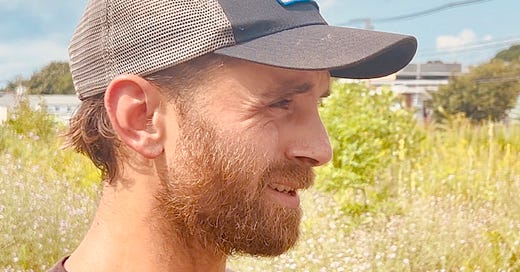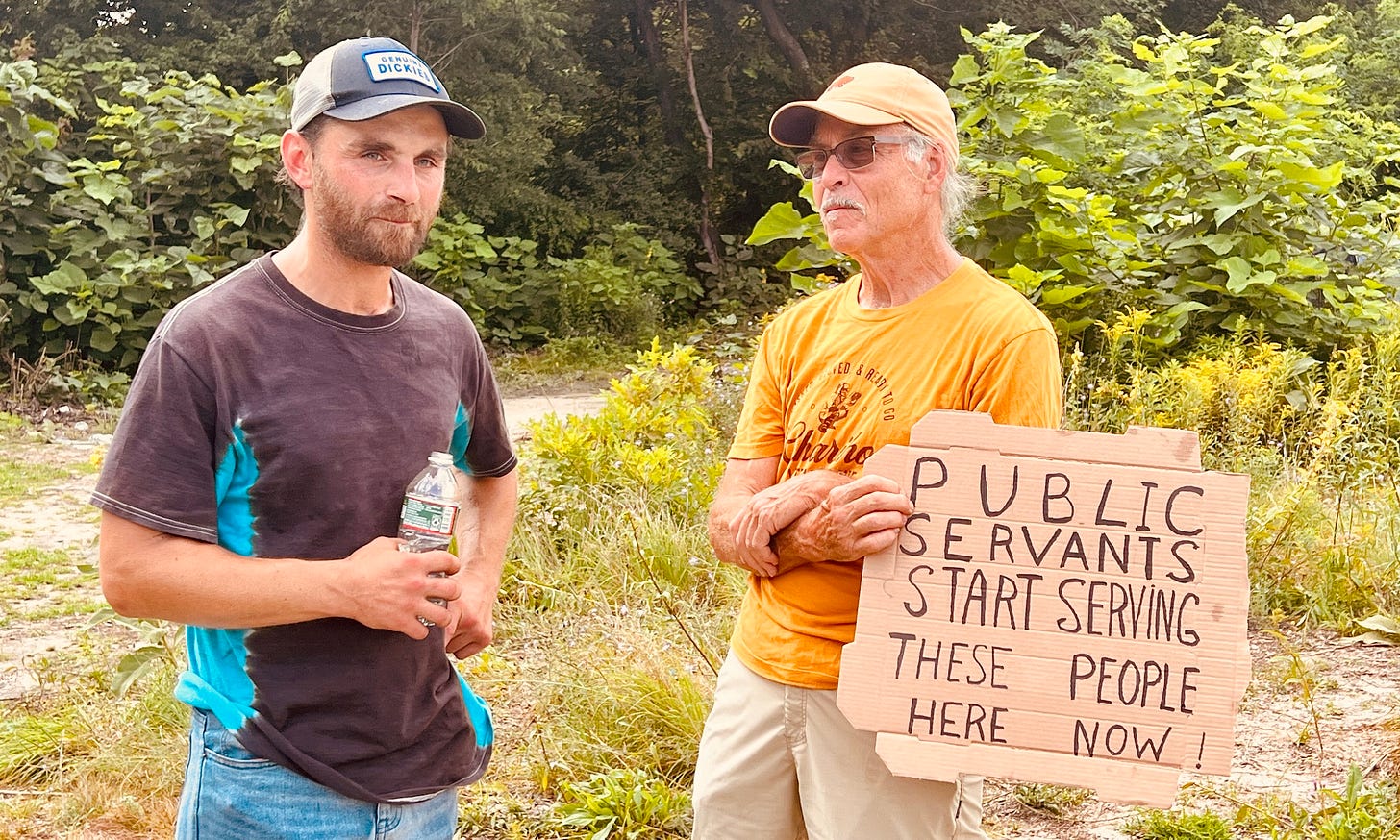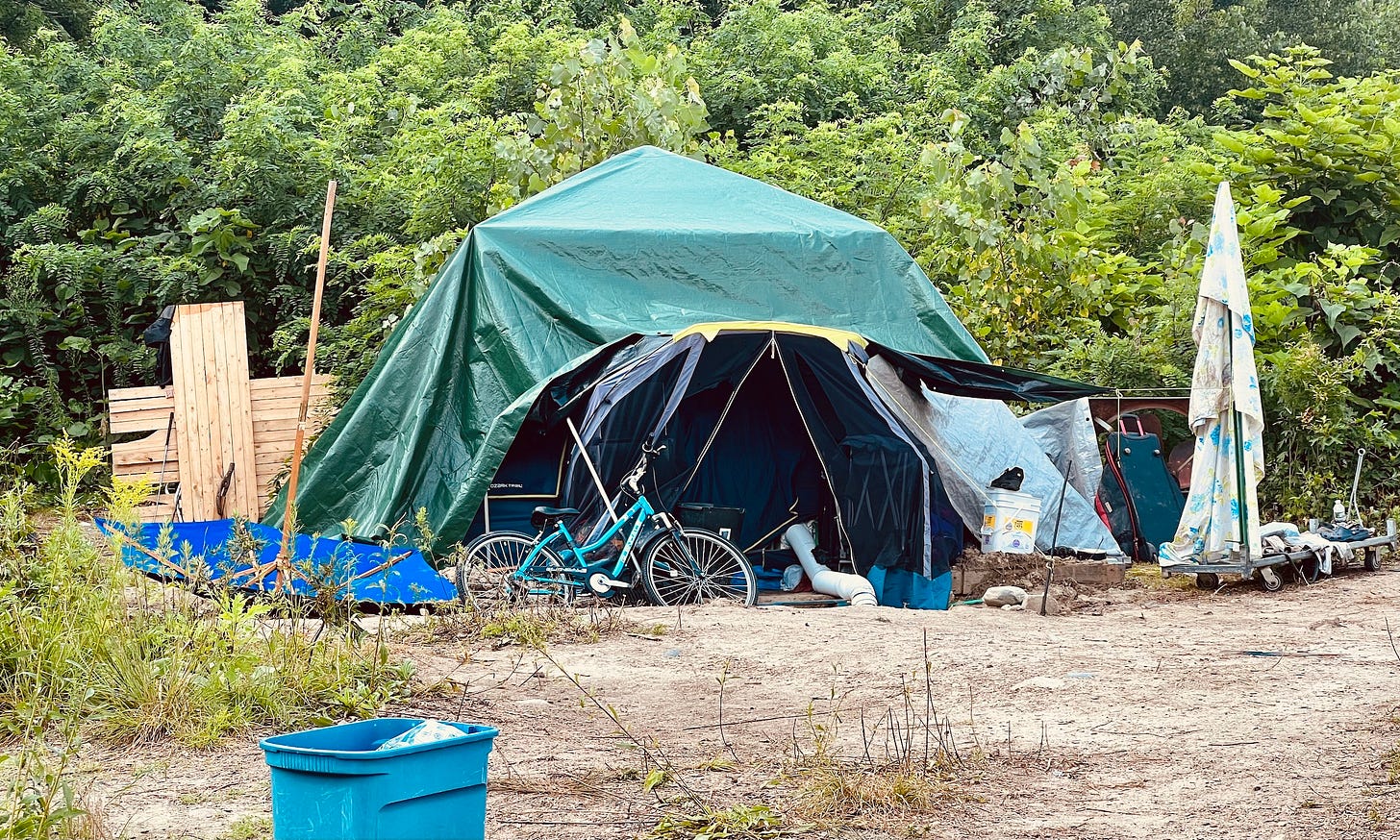Charles Street Tent Encampment pushes back against possible eviction
"I worry about others more than I worry about myself because you got some people out here that haven't been through this. They don't have the experience of being outside."
“I've been living in the encampment here on Charles Street a little bit over three years now," said Billy Pardee to reporters at the Charles Street Tent Encampment in Providence. "My experience has been a trying one, to say the least. You know what I mean? Homelessness is what it is. Everything it looks to be, it is. There comes the territory of falling victim to the temptation of drugs to cope with the conditions of homelessness.
"And honestly, what I have found is, in the absence of my family, a new network that has kept me afloat and met that need for not being alone, for having some sort of comfort, and having someone there for you. It's formed that knitted bond that we all share, that family network that we have. It's the reason why, speaking for myself, I remain stuck a little bit because having estranged my family once already, and having found an extension of my family here, I refuse to lose any more family. I refuse to lose more than what I already have in life.
"It's a tough position to be in."
On Tuesday, protesters from the Charles Steet Tent Encampment alongside advocates and allies1, gathered to demand that Providence Mayor Brett Smiley immediately stop the intended raid and eviction of those camped there.
“What we're demanding of Mayor Smiley, and we've been saying this to him for months now, is if you're going to issue vacate orders, make sure that people have humane alternatives in terms of shelter or housing,” said Professor Eric Hirsch, Interim Director of the Rhode Island Homeless Advocacy Project and a Professor of Sociology at Providence College. “Mayor Smiley has done zero nothing to make that happen. We asked him to identify buildings that could have shelter beds and his administration said we don't have any buildings that would work. We asked him to set up rapidly deployable shelters. You order these kits and set up these rapidly employable shelters that hold two people. We asked him to set up 50 of those. He said he would look into it and find sites. He never found any sites.
“We asked him to tell the police to hold people harmless and not to harass them and certainly not try to remove them from any part of the city unless they were providing shelter or housing. He never responded to that demand and then he started negotiating with the state to issue a vacate order here.”
According to the state’s Homeless Management Information System, there were 348 individuals forced to spend at least one night in a place not meant for human habitation in the two weeks ending on June 30. Towns and cities such as West Warwick, Warwick, Cranston, Providence, Pawtucket, and Woonsocket have all chosen to approach this problem through raids to clear encampments without making a real effort to meet the shelter and housing needs of their residents. Cranston Mayor Kenneth Hopkins denied knowing anything about vacate orders issued on July 12 to residents of encampments even though his police department issued those orders. His police handed out a worthless list of available services from 2008.
“I'm out here today because I heard the news was coming,” said Billy Pardee. “I heard there were going to be some officials on their way so I decided to grab a garbage can and clean up a little bit, you know what I mean? Do my part because this is where I live. For the three-plus years that I've been out here alongside the people with me today, we've never been offered anything to push us out of this environment that we've found ourselves in.
“Where are we going to go? You know what I mean? It's like we receded into the woods to hide from the public face and then it's like a sore to look at us. This is our perspective. I try to look at the brighter side of things, however, I can't ignore it. I'm not proud of the way that I look. I'm not proud of the way that I live. My quality of life is not up to par. I think that I speak for many of us in that regard. So to push us out of the woods would potentially serve as an opportunity, but to go where?
“Opportunities have been offered to a lot of individuals and I would imagine some have capitalized on that, at least I hope so,” concluded Billy Pardee. “But as far as myself, I haven't sought one out. I don't think I've been ready to, but I have been inching further and closer to preparing myself for not so much for an exit but for a change and improvement. You know what I mean? I don't want to leave the environment altogether. I want to improve upon it and bring it with me. I don't want to go alone for sure. You know what I mean?”
According to the coalition of advocacy groups at the encampment, “The approach to this housing crisis must be to develop effective paths to permanent supportive and deeply subsidized housing rather than to raid and clear encampments. The effort must involve all Rhode Islanders and all cities and towns. Mayors and City Councils should not be avoiding responsibility by claiming that it is only the state’s responsibility. It costs taxpayer dollars when homelessness is allowed to continue, particularly as unsheltered people experience the health consequences of living outside and run up millions in Medicaid expenses when they wind up in ambulances, emergency rooms, hospital and assisted living, and nursing home beds.”
Reporters also heard from Danny Griffiths, who has been unhoused for almost three and a half years. Danny was over in Fox Point when that encampment got bulldozed and was at the State House encampment too. “I’ve been at pretty much every big encampment we had,” he said.
“I like to speak generally as far as homelessness goes,” said Danny. “For me, it's been a lot of trials and tribulations. I'm a family man. I held a job. I was in college. I was in the United States military. I've had a lot of things that had gone positive for me, but life took a left turn as far as the throws of drug addiction and my family falling apart, losing things. That's the story of everyone here. You could have the same conversation, ask the same questions, get the same answers. They may not be the same, but they will be roundabout the same.
“It's been tough. It's camping but on a different level. You can't get out of it. If you look at the gate, there's a cardboard cutout that says, ‘Abandon all hope ye who enter here.’ It's what is written on the gates of Hell.
“The wonderful thing about having nothing is that you're not worried about having nothing. You can make something out of nothing. All of us here are survivors in one way, shape, or form. It's scary for other people. I worry about others more than I worry about myself because you got some people out here that haven't been through this. They don't have the experience of being outside. They get caught in a rainstorm and the tent gets flooded out, their clothes get wet and they don't know what to do. They panic and they end up overdosing or killing themselves. I worry about them. I mean, I worry for myself but I'm a survivor. Ultimately I'll make it through, but I just don't think that it's fair.
“And who are these [government officials]? Tell them to come down here and live out here for a week. It's not like I chose to be out here. It's not like we chose to be out here. We are here because things happened in our lives to put us here.
“We need a lot of help and a lot of support. More beds in rehabs. More beds in detox centers. Right now they're all filled up because of people that don't have affordable housing. We need city officials and the government to come down here and take a look at what they're trying to destroy, talk to the people that they're trying to destroy. Talk to the people that lose their kids' pictures that they bulldoze or other things of that nature - personal effects that get taken away from them. For some of us, it's the last of what we have for memories of a positive time.
“A guy making six figures a year, what does he care? He's all about the dollar. I challenge you to come down here and speak to some of us and see what you are prepared to destroy by the wave of a pen,” concluded Danny Griffiths. “I challenge state officials to think about what they're about to destroy before they do it. Try and show some love, some compassion. Homelessness in the country is a real issue. Look deep into yourselves as to how many of these encampments are you going to bulldoze. Cause we're just going to move somewhere else. You can hide it and bury it for only so long. It was done in the dark but comes to light. So we'll see what happens.”
The coalition is demanding that Mayor Smiley:
Instruct the Providence police to hold harmless and not arrest, ticket, or harass those camped in Providence, given that his administration has done little to nothing to provide any alternatives to their tents.
Provide and service trash receptacles and Porta Potties if requested by those living in tent encampments in the city.
Immediately identify city-owned (or acquire privately owned) buildings to provide at least 100 emergency shelter beds, preferably buildings that can eventually be converted to permanent supportive and/or deeply subsidized housing for extremely low-income households. The city must hire service provider(s) to operate the new shelter(s).
Identify sites for, purchase, and have shipped to Providence enough rapidly deployable shelters to provide beds for 100 individuals in at least two separate shelter villages. Provide electricity, bathrooms, showers, and meal sites for residents.
“The fate of the people here would be to receive a 48-hour vacate order from the city, even though this is state property,” said Professor Hirsch. “Then being forced to leave many of their possessions, because they don't have cars. They're going to have to find another site or a tent because there aren't enough shelter beds. There's not going to be housing for that.
“We think the most important problem here is that people are living in tents in his city. Mayor Smiley does not seem to care whatsoever. I don't think I've heard him say much about this either, saying that homelessness is a serious problem, that there are hundreds of people in his city living outside, and that they're going to do everything they can to solve that properly.
“I'd like to hear him say that and develop a concrete plan to do something to make sure that people don't continue to become homeless and that if they do become homeless, it only lasts a very short period and they never become homeless again. That's what we're trying to accomplish here. My organization, the Rhode Island Homeless Advocacy Project, includes a lot of people who have been homeless and understand how people are suffering, particularly those living outside.
“The city is ignoring us. We keep getting the same email from Mayor Smiley's Chief of Staff, which says, we'll look into it, we'll look into it. Nothing concrete. All we heard from them were a list of agencies that they're contracting with. I don't think anyone from the administration has been down here. I'd like him to be asked what he thinks about the people suffering from floods, from 90-degree heat that's 120 degrees in their tents. I don't think he cares.
“People should call their mayors, they should call their city councilors in particular,” concluded Professor Hirsch. “They're the most important because the only way we're going to get sites for shelter and very low-income housing is if people are supporting them, that's important. So that's what they should do.”
Mayor Smiley's Press Secretary Josh Estrella sent the following to my request for comment:
"There is no vacate order in place at this time. Conversations have been had with providers about better case counseling at this location to best support folks into housing who may be there knowing that this site has to be vacated. The 460 Charles Street area is owned by the State and we have repeatedly shared our concerns with them. Specifically, we are concerned with the safety of the individuals living at this site and have been working with the State and providers to offer services including housing, health, and recovery support. This particular encampment has been of grave concern given the proximity to the highway, the fires, and the now flooding, that has happened over the last few months.
"The majority of the investments made by the City to support housing for individuals experiencing homelessness are contributed to the statewide Consolidated Homeless Fund which is governed by the state's Coordinated Entry System. In addition to including a Housing Resource Coordinator position in Mayor Smiley's first budget, last month the City invested $263,000 to extend the use of current shelter beds. This is in addition to the $3.4 million we've spent over the last year for shelter beds and the $250,000 we allocated to Amos House in this year's budget to support the continuation of the successful Hand Up program."
The Rhode Island Homeless Advocacy Project (RIHAP), Housing Opportunities for People Everywhere (HOPE), Gather Together United as 1 (GTUA1), the Rhode Island Poor People’s Campaign, Better Lives Rhode Island (BLRI), Mathewson Church Housing Justice Committee, and Direct Action for Rights and Equality (DARE).








Thanks for keeping us informed. The demands are reasonable and opening enough shelter beds would save money in costs to emergency services. Making housing in RI more affordable would help us with the population drain that almost cost us a seat in Congress in 2020.
Such eloquence! Billy and Danny share compassion for the newbies. The people form community/ family. The ultimate question is for each of us to answer “Where are we going to go? You know what I mean? It's like we receded into the woods to hide from the public face and then it's like a sore to look at us. This is our perspective.” (Billy)